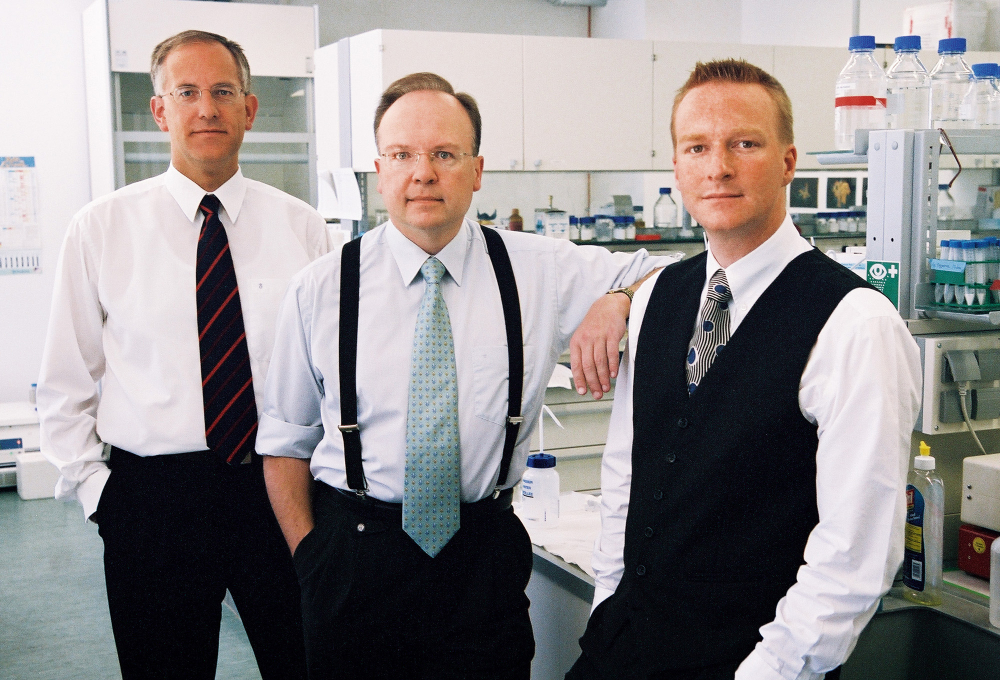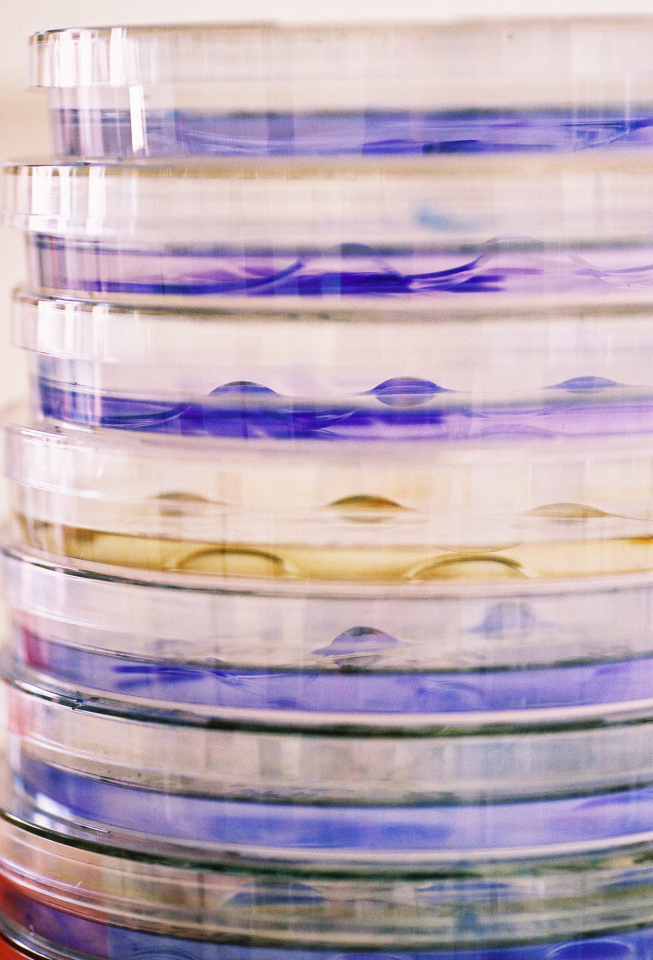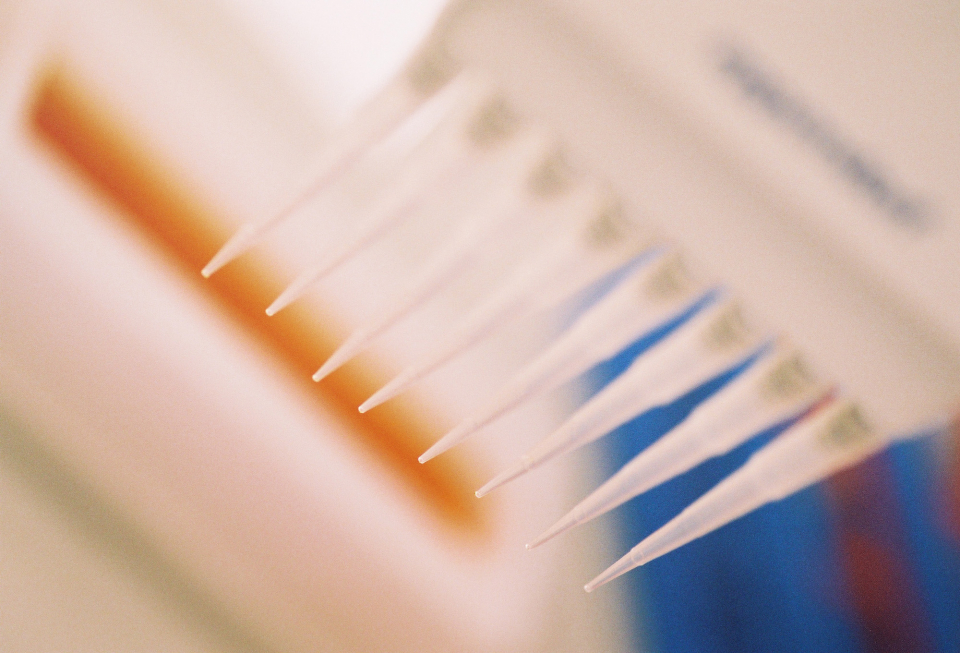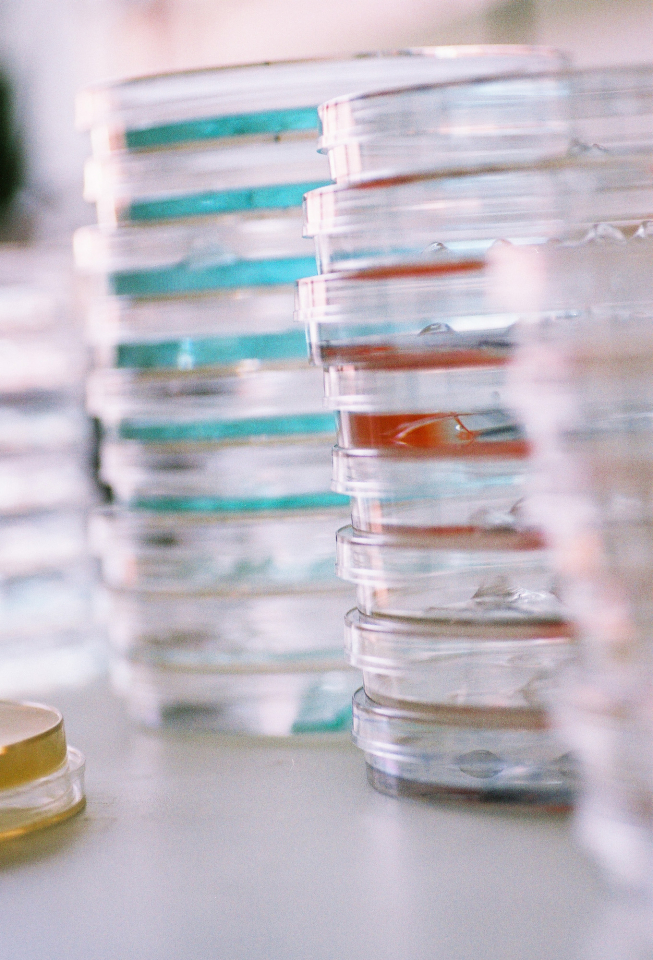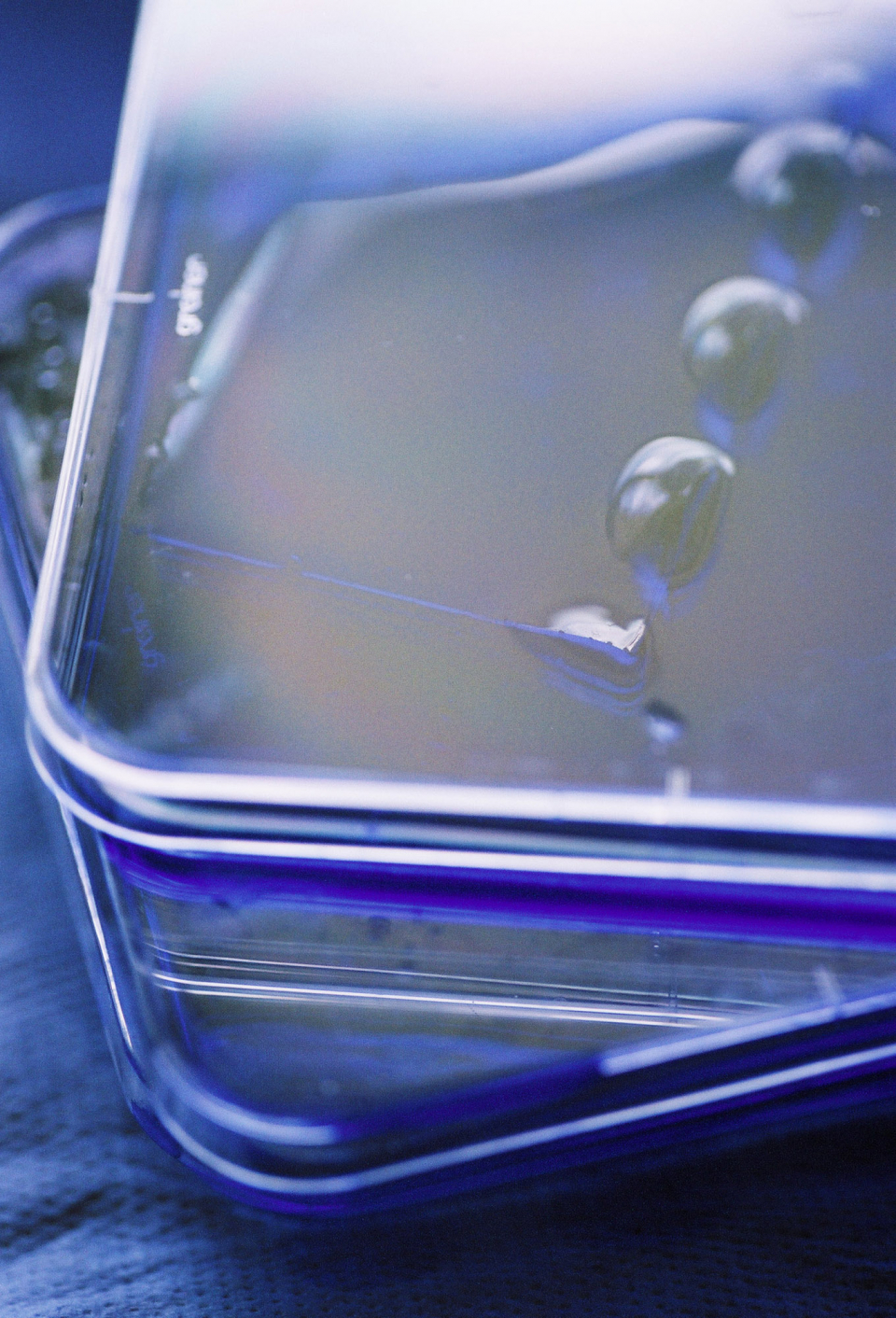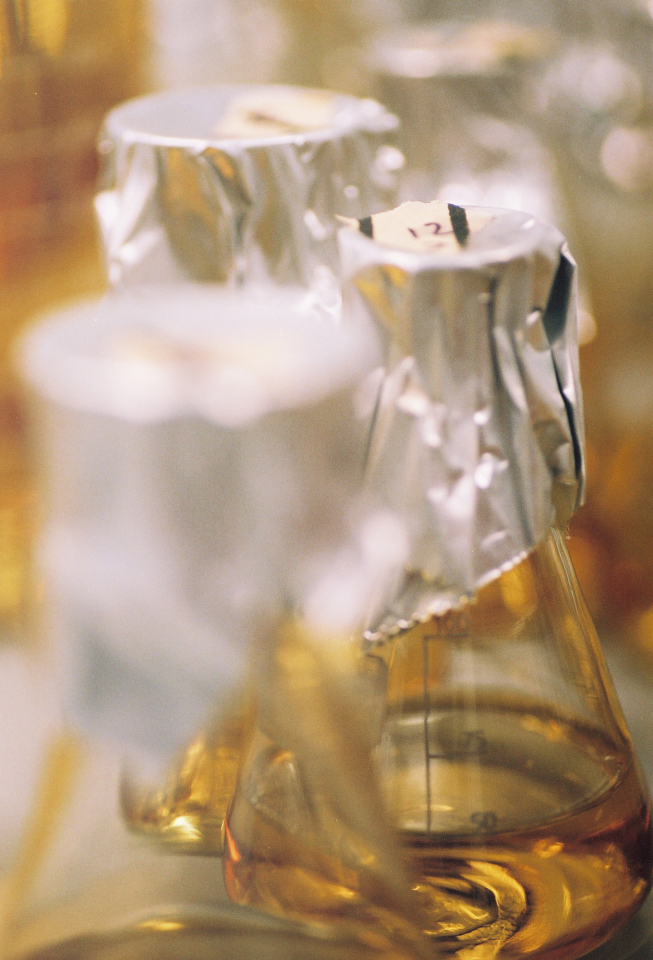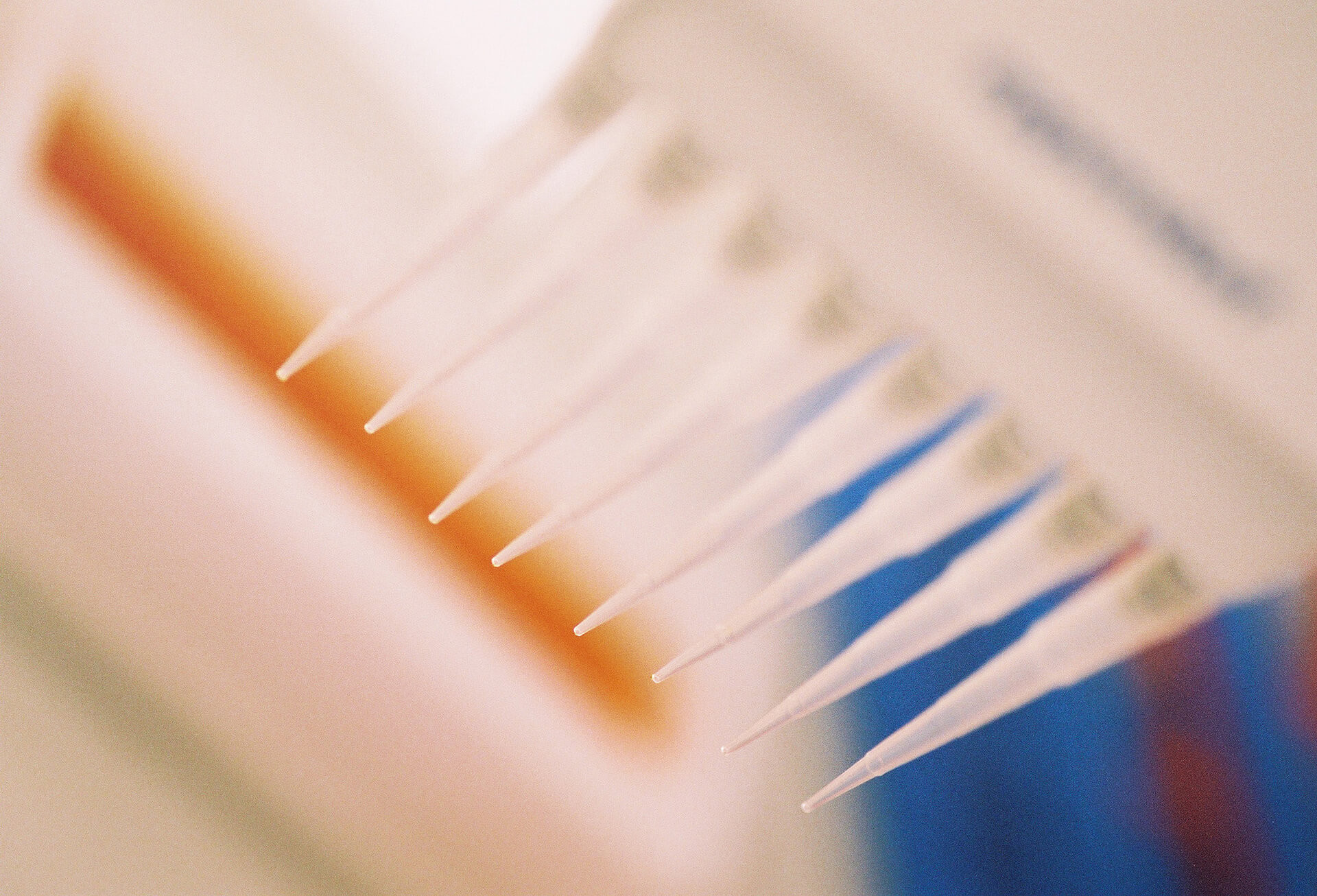
Nominee 2004
Wirkstoffe durch Protein-Design
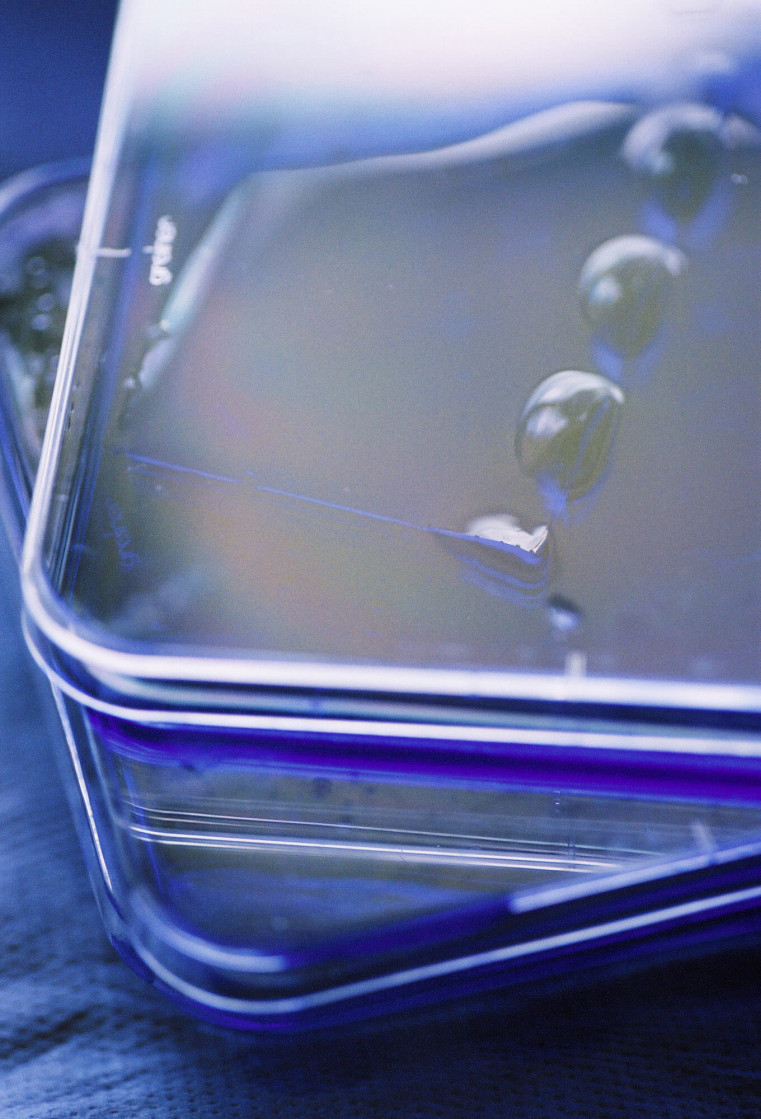
Arne Skerra, Martin Pöhlchen and Steffen Schlehuber have discovered an alternative to conventional antibodies – by producing a completely new type of protein. Arne Skerra is a full professor and holds the chair for Biological Chemistry at the Technical University Munich and founder of PIERIS Proteolab AG in Freising-Weihenstephan. Martin Pölchen manages the start-up company as chairman of the board, Steffen Schlehuber is the company’s CSO.
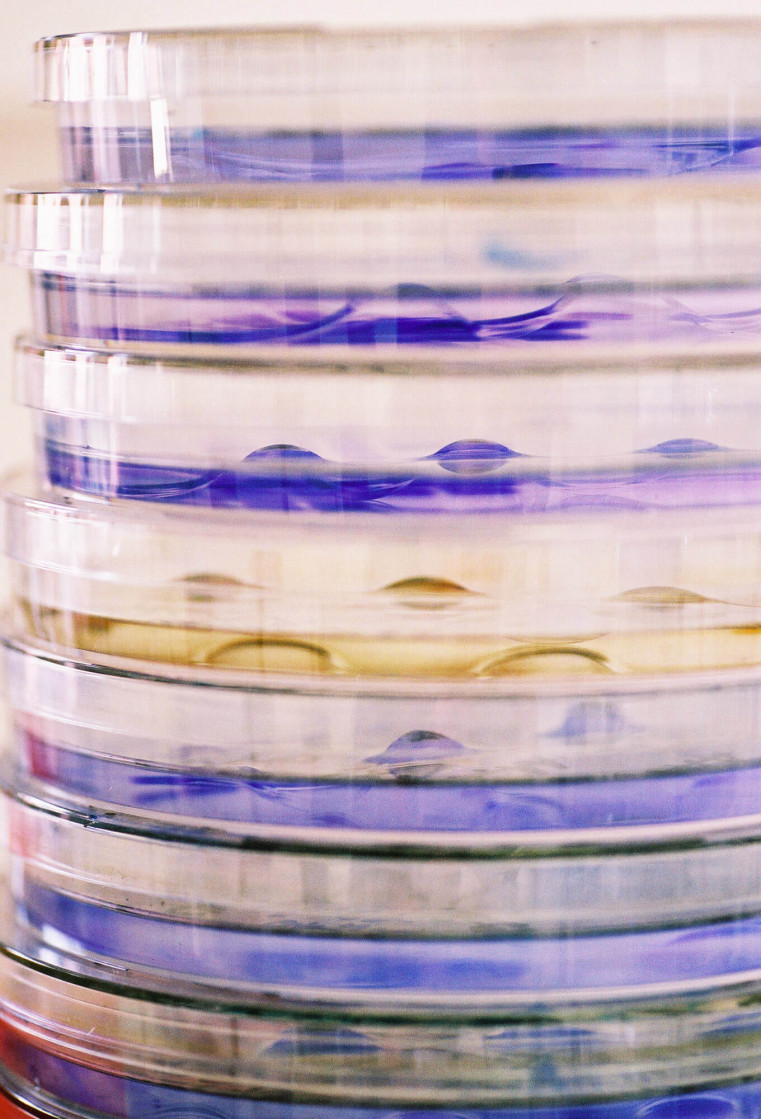
The conventional tools: complicated and unwieldy
Antibodies – the proteins of the immune system – have always been considered universal biochemical tools that allow molecular and cellular structures to be identified, bound, and marked.
more details
Resumes

Prof. Dr. rer. nat. Dipl.-Ing. Arne Skerra
- 30.07.1961
- geboren in Wiesbaden
- 1980 – 1985
- Studium der Chemie an der Technischen Hochschule Darmstadt
- 1982 – 1985
- Stipendium der Studienstiftung des deutschen Volkes
- 1986 – 1989
- Doktorarbeit am Genzentrum und Promotion an der Ludwig-Maximilians-Universität München; Kekulé-Stipendium der Stiftung Volkswagenwerk
- 1990
- Postdoktorand am MRC Laboratory of Molecular Biology, Cambridge, UK; Stipendium des Deutschen Akademischen Austauschdienstes
- 1991 – 1994
- Gruppenleiter am Max-Planck-Institut für Biophysik
- 1993 – 1996
- Initiator und erster Sprecher der Studiengruppe „Protein Engineering und Design“ der Gesellschaft für Biochemie und Molekularbiologie (GBM)
- 1994 – 1998
- C3-Professor für Proteinchemie, Fachbereich Chemie, Technische Universität Darmstadt
- 1995
- Habilitation für das Fachgebiet Biochemie an der Johann Wolfgang Goethe-Universität, Frankfurt am Main
- 1997 – 1998
- Geschäftsführender Direktor des Instituts für Biochemie, Technische Universität Darmstadt
- seit 1997
- Vertrauensdozent der Studienstiftung des deutschen Volkes
- seit 1998
- Ordinarius am Lehrstuhl für Biologische Chemie der Technischen Universität München, Freising-Weihenstephan
- 1999 – 2001
- Geschäftsführer des Forschungsdepartments für biowissenschaftliche Grundlagen am WissenschaftsZentrum Weihenstephan, Freising
- seit 2000
- Initiator und inhaltlicher Koordinator des Bachelor/Master-Studiengangs Molekulare Biotechnologie an der Technischen Universität München
- seit 2001
- Mitgründer und Aufsichtsrat der PIERIS Proteolab AG, Freising
- seit 2002
- Mitglied im Expertengremium „Biotechnologiestandort München“ des Bayerischen Staatsministers für Wirtschaft, Verkehr und Technologie; Wissenschaftlicher Beirat der Forschungsneutronenquelle Garching FRM-II
- seit 2003
- Vorstand der Fachgruppe Biochemie der Gesellschaft Deutscher Chemiker; Tutor der Bayerischen EliteAkademie; Sprecher der GBM-Studiengruppe „Protein Engineering und Design“; Mitglied im Fachbereichsrat des WissenschaftsZentrum Weihenstephan, Technische Universität München
Ehrungen:
- 1983
- Preis der Dr. Anton-Keller-Stiftung, Darmstadt
- 1996 – 1998
- Dozentenstipendium des Fonds der Chemischen Industrie
- 2000
- 1. Preis im Münchner Business Plan Wettbewerb
- 2002
- Nominierung für den 2002 World Technology Award for Biotechnology, New York City

Dr. rer. nat. Dipl.-Chem. Martin Pöhlchen
- 22.05.1962
- geboren in Bochum
- 1983 – 1988
- Studium der Chemie, Ruhr-Universität Bochum
- 1989 – 1992
- Promotion in Chemie, Lehrstuhl für Theoretische Chemie,Ruhr-Universität Bochum
- 1989 – 1992
- Wissenschaftlicher Mitarbeiter, Ruhr-Universität Bochum
- 1992
- Reisestipendium der Deutschen Forschungsgemeinschaft (DFG), Institut für Theoretische Physik, Universität Stockholm
- 1992 – 1995
- Account & Territory Manager for Software and Hardware Sales, Evans & Sutherland GmbH, Tripos GmbH, München
- 1995 – 1998
- European Commercial Director, zuständig für den Verkauf von kombinatorischen Chemiesubstanzbibliotheken, von Drug-Discovery-Dienstleistungen und von Software, Tripos GmbH, München
- 1998 – 2001
- Vice President Business Development, MediGene AG, München
- 1998 – 2000
- Mitglied des DVFA-Kommittees (Deutsche Vereinigung für Finanzanalyse und Asset Management) „Neue Märkte – Innovative Unternehmen“
- seit 1999
- Juror und Coach beim Münchner Business Plan Wettbewerb
- seit 2001
- Vorstandsvorsitzender der PIERIS Proteolab AG, Freising
- seit 2004
- Mitglied Roundtable Biotechnologie des Bayerischen Staatsministers für Wirtschaft, Verkehr und Technologie
Ehrungen:
- 1983
- Ehrenmedaille der Bundeswehr als Wehrpflichtiger
- 2001
- Best Business Proposition (PIERIS Proteolab AG) at Biotech & Finance Forum, Paris
- 2002
- Nominierung für den 2002 World Technology Award for Biotechnology, New York City
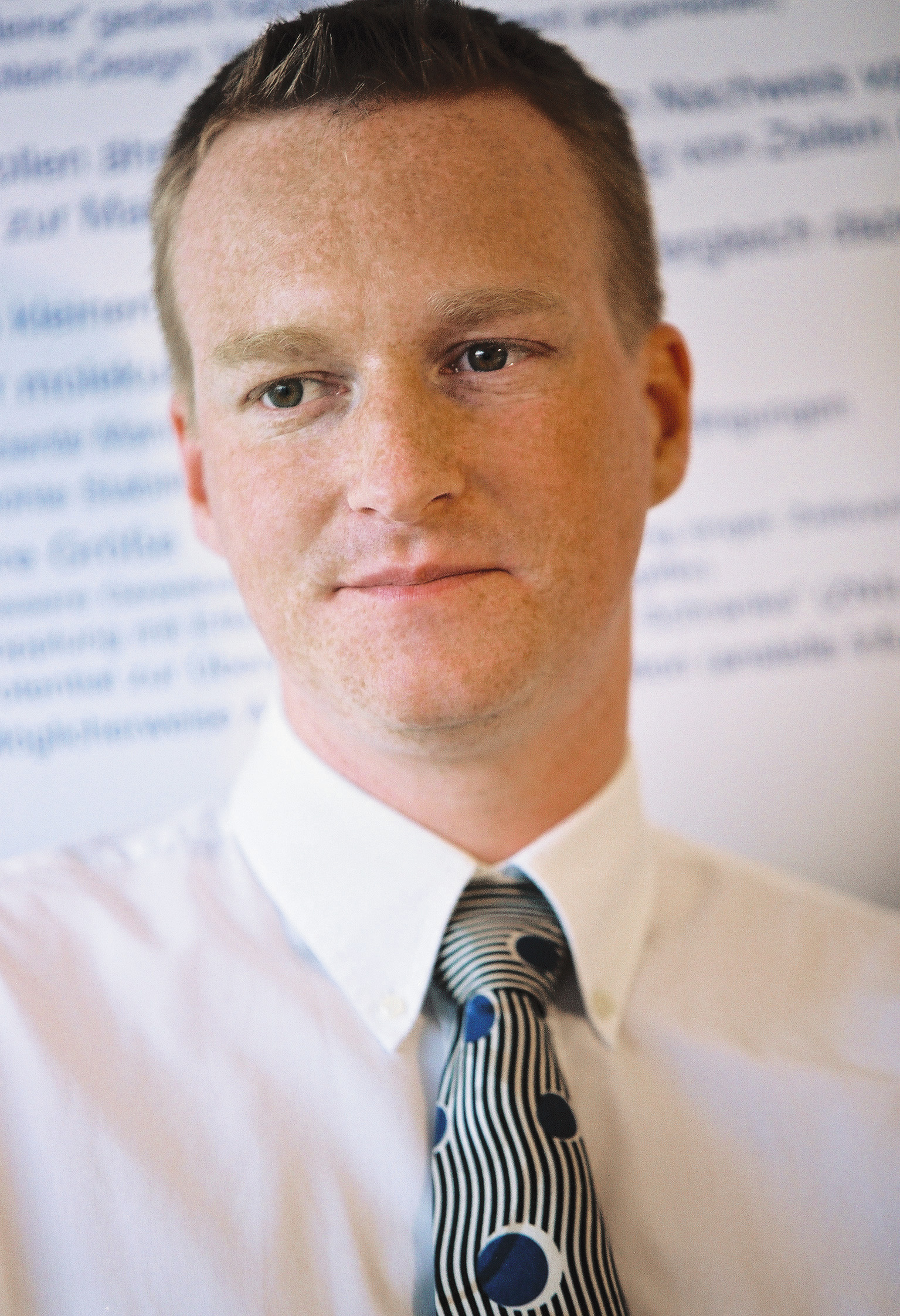
Dr. rer. nat. Dipl.-Ing. Steffen Schlehuber
- 20.07.1972
- geboren in Fulda
- 1991 – 1996
- Studium der Chemie, Technische Universität Darmstadt
- 1997 – 2001
- Doktorarbeit und Promotion in der Arbeitsgruppe von Prof. Dr. Skerra, Technische Universität Darmstadt und Technische Universität München Wissenschaftlicher Mitarbeiter, Abteilung Proteinchemie, Institut für Biochemie, Technische Universität Darmstadt und Lehrstuhl für Biologische Chemie, Technische Universität München
- 2001
- Promotion
- seit 2001
- Mitgründer und Chief Scientific Officer (CSO) der PIERIS Proteolab AG, Freising Entwicklung der 10 Mrd. humane ANTICALIN®e umfassenden THERACALIN®-Bibliothek
Ehrungen:
- 1998
- Preis der Dr. Anton-Keller-Stiftung, Darmstadt
- 2000
- 1. Preis im Münchner Business Plan Wettbewerb
- 2002
- Nominierung für den 2002 World Technology Award for Biotechnology, New York City
Contact
Spokesperson
Prof. Dr. rer. nat. Arne Skerra
Lehrstuhl für Biologische Chemie
Technische Universität München
An der Saatzucht 5
85350 Freising-Weihenstephan
Tel.: +49 (0) 8161 / 71 43 51
Fax: +49 (0) 8161 / 71 43 52
E-Mail: skerra@wzw.tum.de
Press
Dr. Martin Pöhlchen
Vorstandsvorsitzender der
PIERIS Proteolab AG
Lise-Meitner-Straße 30
85354 Freising-Weihenstephan
Tel.: +49 (0) 8161 / 14 11 400
Fax: +49 (0) 8161 / 14 11 444
E-Mail: info@pieris.biz
Beschreibung der Institute und Unternehmen zu ihren nominierten Projekten
Antibodies are a general-purpose weapon of physicians- whose application, however, is limited and production costly.
Are there better alternatives?
Arne Skerra, Martin Pöhlchen and Steffen Schlehuber have discovered an alternative to conventional antibodies – by producing a completely new type of protein. Arne Skerra is a full professor and holds the chair for Biological Chemistry at the Technical University Munich and founder of PIERIS Proteolab AG in Freising-Weihenstephan. Martin Pölchen manages the start-up company as chairman of the board, Steffen Schlehuber is the company’s CSO.
The conventional tools: complicated and unwieldy
Antibodies – the proteins of the immune system – have always been considered universal biochemical tools that allow molecular and cellular structures to be identified, bound, and marked. The only drawback: antibodies have a complex molecular structure. They consist of four protein chains and also find it difficult to penetrate the interspaces between cells due to their size. This limits the medical application of antibodies which are also quite costly to produce.
Skerra and his team succeeded in applying the functional principle of antibodies to another protein structure scaffold. Using lipocalins, a virtually ignored family of molecules, they engineered a new type of protein. These agents known as ANTICALINS constitute an alternative to antibodies and have numerous promising applications in research, medicine, and biotechnology.
The new proteins: simple, small, and versatile
Anticalins have a simpler structure and are considerably smaller than antibodies. They are produced with the help of easily cultured microorganisms. The simple structure of the anticalins also allows them to bind with other proteins. In this way, they can be endowed with enzyme properties or caused to remain in the body for a certain retention time. Anticalins can also be used for the same applications as antibodies. They can be used to neutralize toxins and promote their excretion from the body. Certain types of cells, like those in the immune system, can be activated or deactivated with their help.
As a biotechnology innovation, the novel proteins are sold by PIERIS Proteolab. Their principal field of application is cardiovascular and tumor therapeutics. Researchers expect a special effect from the ability of anticalins to recognize the surface structure of cancerous cells and to target tumors with cytotoxins. The development of marketable drugs is planned.
The right to nominate outstanding achievements for the German Future Award is incumbent on leading German institutions in Science and Industry as well as foundations.
The Project “Anticalins® - Biopharmaceutical Agents from Protein Engineering” was nominated by the Deutscher Verband Technisch-Wissenschaftlicher Vereine (German Federation of Technical and Scientific Organizations).
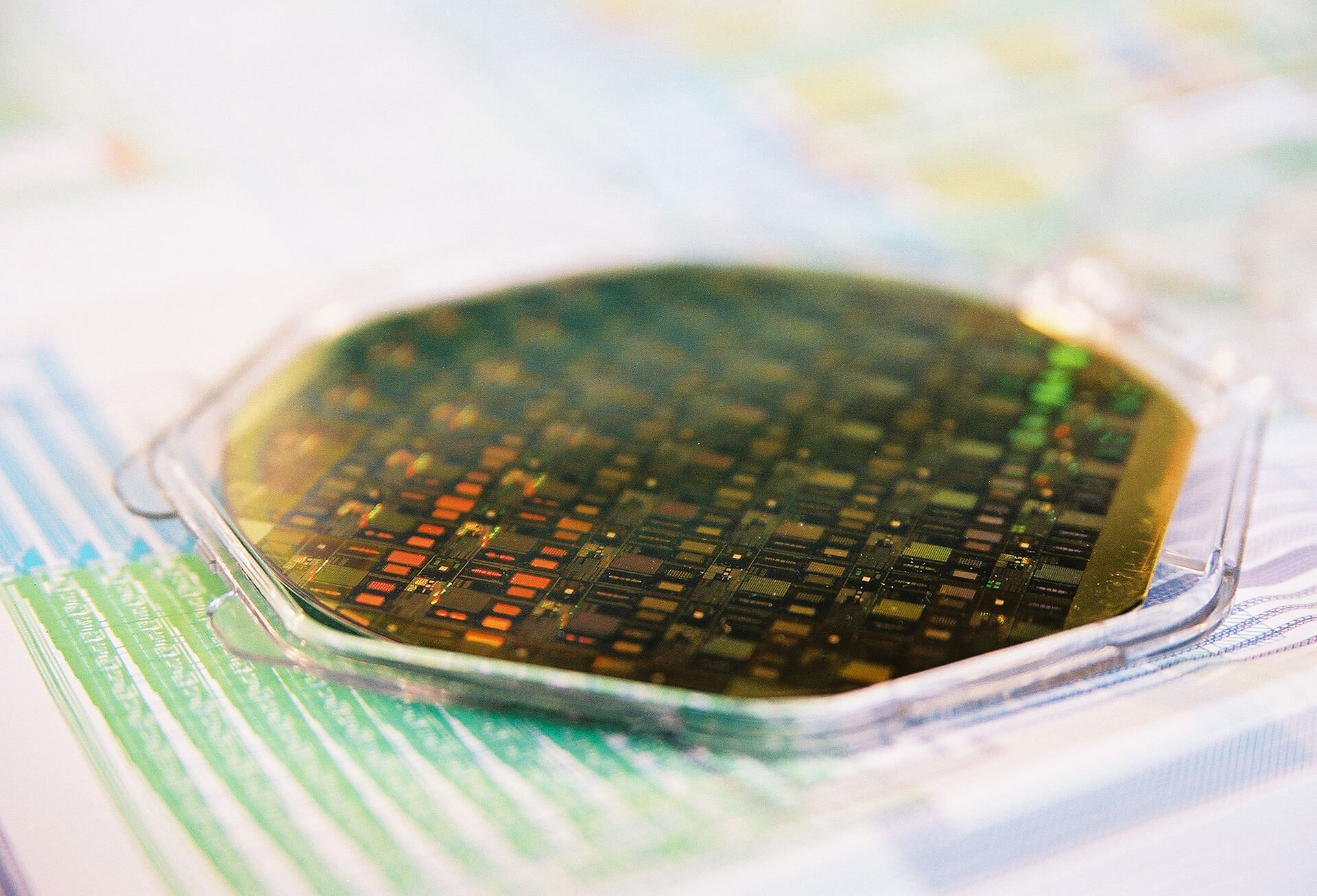

 Gebärdensprache
Gebärdensprache
 Leichte Sprache
Leichte Sprache


